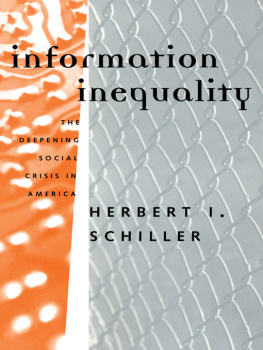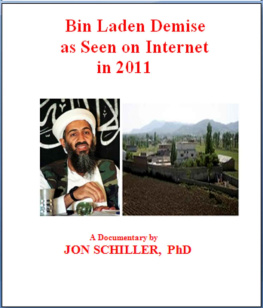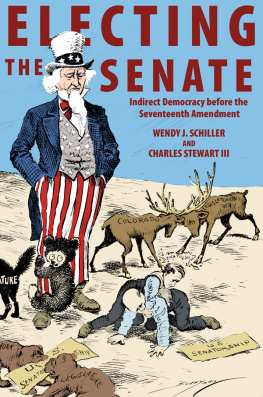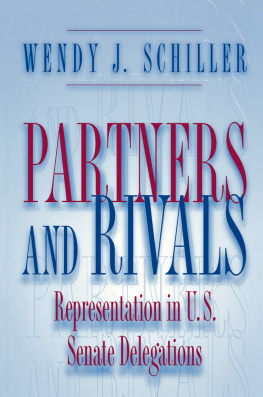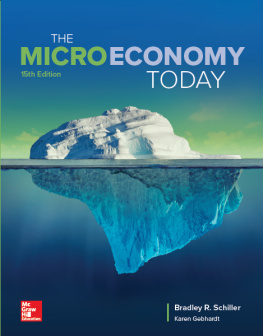Schiller - Information Inequality
Here you can read online Schiller - Information Inequality full text of the book (entire story) in english for free. Download pdf and epub, get meaning, cover and reviews about this ebook. year: 1996, publisher: Taylor & Francis (CAM), genre: Politics. Description of the work, (preface) as well as reviews are available. Best literature library LitArk.com created for fans of good reading and offers a wide selection of genres:
Romance novel
Science fiction
Adventure
Detective
Science
History
Home and family
Prose
Art
Politics
Computer
Non-fiction
Religion
Business
Children
Humor
Choose a favorite category and find really read worthwhile books. Enjoy immersion in the world of imagination, feel the emotions of the characters or learn something new for yourself, make an fascinating discovery.
Information Inequality: summary, description and annotation
We offer to read an annotation, description, summary or preface (depends on what the author of the book "Information Inequality" wrote himself). If you haven't found the necessary information about the book — write in the comments, we will try to find it.
Information Inequality — read online for free the complete book (whole text) full work
Below is the text of the book, divided by pages. System saving the place of the last page read, allows you to conveniently read the book "Information Inequality" online for free, without having to search again every time where you left off. Put a bookmark, and you can go to the page where you finished reading at any time.
Font size:
Interval:
Bookmark:

The many individual influences that shape a text are not easily traceable. Here I make a surely incomplete effort to acknowledge some of them.
I was fortunate to have the assistance of several talented (former) graduate students over the course of the books germination and preparation. Helpful in numerous ways were Joyce Evans, Sarah Banet-Weiser, Jennifer Troutner, and Dennis Mazzocco. I am especially indebted to Judith Gregory, who contributed basic background research for the chapter on special effects.
As in the past, I relied heavily on my information-rich family infrastructure. Anita, Dan, and Zach Schiller and Susan Davis provided their considerable knowledge and encouragement to the work in progress. Edward Herman has been a steadfast friend.
Sandy Dijkstra offered good advice and solid support. Bill Germano was the initiating stimulus for the project. He has been a patient and understanding editor. Christine Cipriani guided the work to publication carefully and efficiently.
Hamid Mowlana at American University and Neil Postman at New York University provided me with comfortable accommodations and services while the project went forward.
In the end, however, this book could never have been completed without Anitas total dedication to my well-being and my recovery from an accident in the early winter of 1994.
Why do we have such trust in, or perhaps cynicism about, the institutions and practices of American life that few question the structured positions of privilege and domination? This is not to say there is an absence of criticism of a social practice or an individuals behavior. Far from it! There is a surfeit of reports on misdemeanors and malfeasance, locally and nationally. Yet efforts to offer a comprehensive explanation of these varied examples of exploitation, corruption of office, and shockingly self-interested behavior of the well off and well positioned are invariably dismissed either as conspiratorial or paranoiac.
This has not always been the case. Often in American history turbulent social movements arose to challenge the order existing at the time. In mounting these sometimes large-scale protests, it was natural that many of the prevailing social institutions would be radically questioned.
Today, a remarkable edifice of invisible control has been constructed, permitting the most far-reaching measures of social domination to escape significant public attention. This achievement is all the more startling when it is accompanied by the bold assertion, widely believed, that the overarching condition of American life is freedom, freedom that exists throughout the political realm and encompasses the full range of individual behavior.
Americans are free is the message that circulates internationally. It is a statement that most Americans endorse. There are, of course, some who do not subscribe to this belief. For the most part, they are disenfranchised by color or income. It is a sizable group but is far from a majority.
Many elements contribute to the general willingness to accept the prevailing definition of freedom. Not least is the absence of easily identifiable controls over, and intrusions into, individual life. Actually, few formal censors preside over the publics reading, viewing, and listening habits and materials. With the same exceptionscolor and incomethere are no police visitations or harassments.
People can, with some exceptions, express themselves freely. Meetings and, to a somewhat lesser extent, parades, can be organized without difficulty. Macys Thanksgiving Day Parade in New York City, televised nationally, has no trouble in getting a permit. Striking workers, however, might meet resistance in applying for a parade permit.
Where, then, is this invisible edifice of social control? Its central locus, to be sure, is embedded in the structure of the economythe ownership of property and authority over the allocation of fundamental resources. Here, however, I will focus on another site of power, the cultural industries: film, television, radio, music, education, theme parks, publishing, and computerization. These industries constitute no secondary sphere of influence. Indeed, throughout the twentieth century, and especially during the last twenty-five years, the informational and cultural sector has ascended to a prominent place on the commanding heights of the economy. The term cultural industries itself is indicative of the fusing of cultural with industrial power.
More than in any earlier time, the cultural industries have assumed centrality in daily life and in the nations overall economy. Consequently, the rules and procedures followed in these industries are, or should be, of vital interest. Found therein are the operational codes, appearing as unexceptional internal organizational practices, by which the outlook and beliefs of the community are produced, refined, and maintained.
The key lever at the disposal of cultural industry managers in regulating what people think and believe is the review and selection process. It is, in brief, the way cultural products and processes, are admitted or rejected for general public consumption. It includes also how individuals are selected for the many positions that need to be filled in the cultural industries (e.g., journalists, broadcasters, editors, administrators, teachers, curators, directors, and producers); in a word, how the cadres that work in the media and cultural spheres get their jobs.
Regis Debray, in his volume Teachers, Writers, Celebrities , had something to say about the review and selection process in the French context.
The French intelligentsia applies the term [power] to the most varied collection of professional bodies, institutions and nouns, often pertinently, but never to itself. It never stops talking about the mechanisms, network and diagrams of the past and other places, but seems to maintain a stubborn silence as to its own mechanism of selection-censorship and promotion-exclusion hic et nunc in the university, publishing and media. Could it be that intellectual power does not exist in the eyes of the intellectuals?
Reticence about this condition, applied to the cultural field, is no less evident in the United States. This is perhaps even more surprising since pop culturethe for-profit production of culture for huge consuming publicshas become a significant part of the domestic economy, while at the same time being a booming field of exports to the world market. It might seem that the breadth of this vast and constantly expanding sphere could not possibly be monitored. Nothing less than a huge administrative bureaucracy would be necessary to police the designs and contents of tens of thousands of media/cultural outputs, produced by a concentrated, but still considerable number of enterprises. Such an apparatus, even if successfulwhich is extremely doubtfulwould surely defeat the systems claim of openness and freedom.
Actually, the supervisory task is handled much less intrusively and generally with little overt direction or publicity. Review and selection filters honeycomb the entire human developmental process, beginning with birth and early education, proceeding to job screening, and continuing throughout the individuals work career. Rarely, if ever, is one in some locale that is insulated from invisible but omnipresent sorting, evaluative, and grading practices. Evidence of the totality of this phenomenon has been the appointment ordeals of several individuals proposed for high-ranking positions throughout the Clinton Administration. One candidate after another, presumably screened with some care to begin with, was abandoned when some detail from an earlier period of life surfaced and was viewed as problematic.
Font size:
Interval:
Bookmark:
Similar books «Information Inequality»
Look at similar books to Information Inequality. We have selected literature similar in name and meaning in the hope of providing readers with more options to find new, interesting, not yet read works.
Discussion, reviews of the book Information Inequality and just readers' own opinions. Leave your comments, write what you think about the work, its meaning or the main characters. Specify what exactly you liked and what you didn't like, and why you think so.

